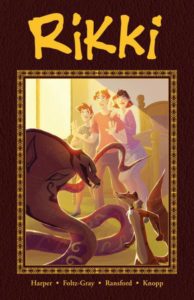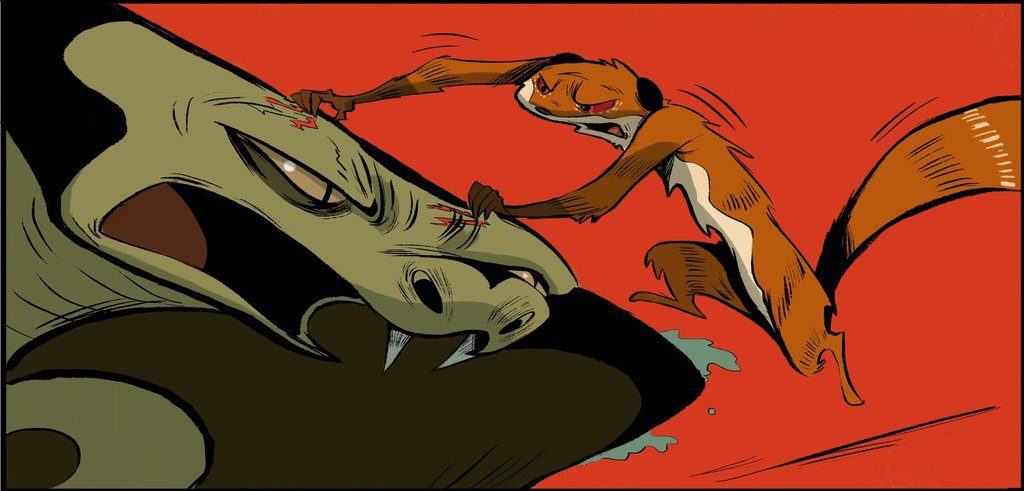 Rikki
Rikki
Norm Harper (s), Matthew Foltz-Gray (p), Oceano Ransford (l), Christine Knopp (cover)
Karatepetshop.com, 2016
Disclaimer: A copy of this comic was provided by the publisher in exchange for an honest review.
Out of all the stories I expected to see at the Alternative Press Expo (APE), Karate Petshop’s Rikki, a retelling of Rudyard Kipling’s short story “Rikki-Tikki-Tavi,” was certainly not one of them. I had read “Rikki-Tikki-Tavi” years ago as a child and always enjoyed it, but few people knew about it. The story is included in Rudyard Kipling’s The Jungle Book and is frequently given short shrift in favor of Mowgli and company. It’s a shame; Kipling gives the cast of “Rikki-Tikki-Tavi” just as much heart as The Jungle Book cast. Still, “Rikki-Tikki-Tavi” always felt like a post-script.
In writer Norm Harper’s hands, Rikki becomes its own animal-centric epic to rival The Jungle Book, which is especially surprising the sparseness of the original text. Harper does an excellent job at fleshing out various characters and their motivations, adding and taking away some characters to tighten up the story. He also approached the story with clear thoughtfulness. All of the new characters introduced have Indian names as befitting the setting. Harper also avoided changing the white family that takes in Rikki/Tavi to Indian given that they have no lines. Even Harper’s decision to break up the name “Rikki-Tikki-Tavi,” which was based on the sound mongooses make, serves to highlight Rikki/Tavi’s two identities. While Tavi is surrounded by other mongooses and the message of what it means to be a mongoose in his clan’s burrow, the rescued Rikki gains new perspectives from other animals at a human family’s home, and it is only Nag and Nagaina’s aggression and desire to rule that forces Rikki/Tavi’s hand, erm, paw.
The story remains intimate. Who hasn’t felt out of place at home or tried to break away from old traditions? And yet the story doesn’t come off as sentimental or preachy.
That Rikki is such a memorable tale isn’t a surprise when you consider its origins. After considering different publishers for Rikki, Harper eventually established Karate Petshop in 2015 to keep the story the way he intended it. The book is clearly the better for it. With Matthew Foltz-Gray (art), Oceano Ransford (lettering), and Christine Knopp’s (cover art) help, Rikki is almost unrecognizable when set next to Kipling’s original story.
Harper’s text is supplemented perfectly by the rest of the Rikki team. Foltz-Gray conveys action even without onomatopoeia. His rough art style is comparable to the art style of Disney’s original Jungle Book and the mostly warm coloring similar to the Pridelands of The Lion King. Knopp’s cover is a softer, more polished version of Foltz-Gray’s style, which does much to lure the reader in. And Ransford’s lettering makes it easy to imagine every sibilant hiss of snake couple Nag and Nagaina, every squawk and screech of Darzee the tailor bird. Some of the action flow from panel to panel is a little stilted, but the reader still feels like they’re right in the middle of the action, which is quite and improvement on Kipling’s dry prose (helpfully included at the back of the book for those eager to read the original story).
If the moral of The Jungle Book is that man can only ever be man and the moral of The Lion King is that one must face one’s destiny and accept one’s place in the world, the moral of Rikki is that we should accept who we are even if it means creating a new role for ourselves. Change may be scary, but it isn’t necessarily a bad thing, which is reassuring in today’s current political climate. Like Rikki/Tavi himself, the Karate Petshop refused to compromise Rikki‘s identity and successfully turned a short story frequently overshadowed by The Jungle Book into a tale that rivals and may even surpass it.


